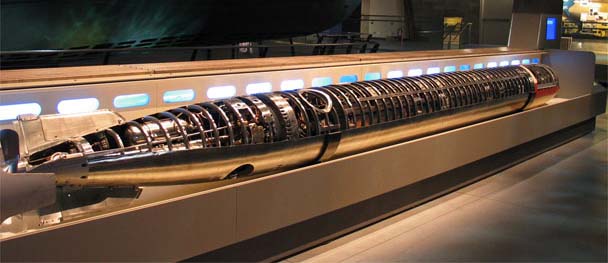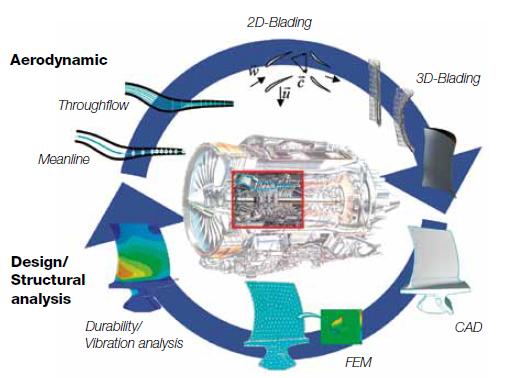Introduction to Calculus
Chapter 1 - Introduction
Section 1.2 - Why Not to Study Calculus
The
Museum of Science and Industry in Chicago
has an impressive submarine from the second World War on display. The size of it
is awesome, appearing as large as the biggest commercial airliner.
However, the most fascinating aspect is not its size
but the complexity of
systems within it.

The submarine's sixteen cylinder diesel and electric engines
are a marvel of wires and pistons all intricately connected in tight
confines. Furthermore, pumps, gauges and hydraulics are plastered
all over within it. One can only imagine the tragic consequences
should any one of these many components fail.

The complexity of this 60 year old submarine makes one wonder how this
was built with any degree of reliability? Was it the creation of an isolated
team of engineers who were just lucky to have designed it correctly?
The
reality is
the design evolved over decades from the field history of many prior designs. Each design
took the collective effort of teams of engineers,
technicians and skilled laborers. Specialized
teams only worked on their niche. For example,
the torpedos have complex mechanical gyroscopes, acoustic honing devices,
electric motors and magnetic detonators. Each alone took dedicated
engineering to design successfully.

Cumulatively, millions of man hours went into making one successful design.
It then astounds your mind to grasp the massive
effort invested into making not just one, but all the
hundreds of submarines in use during the war!
Consider another example, an aircraft engine which
puts many engineering disciplines into conflict:
aerodynamics, mechanical stress, noise and vibration, heat transfer,
material properties, reliability, fatigue life prediction and more. Furthermore,
aircraft manufacturers demand efficient operation, long life and short delivery cycles. It used to take ten years to
develop a new aircraft engine but the industry today aims for an average of only two. The picture below shows the
incredible amount of cutting-edge analysis that goes into the design of just one component of the engine, the
compressor blade.

At the same time, aircraft engine makers are targeting low costs for
the design, manufacturing and maintenance. So it is no
surprise the industry of making all this possible is competitive,
demanding and expensive. In other words, it is highly evolved and
more than any person could do alone.
After considering all this, one realizes that the war industry takes an
entire nation to support. People can not put blame on a "single crazed leader". It is
everyday people toiling away that creates these complex weapons of
destruction.
There is a saying in Haiti, "Don't play with the hungry dog". People under
desperate circumstances will abandon all sense of humanity in order to
preserve their way of life. Herd mentality takes over, wherein
vicious behavior is acceptable so long as everyone else thinks nothing
of it. A famous quote from the Vietnam-US conflict was,
" You will kill 10 of our men, and we will kill 1 of yours, and in the end it will be you who tire of it. "
On the other hand one can not be judgemental and blame things on
"pure evil". Another saying that shows how things need to
be viewed relative to their circumstances is, "One man's genocide is another man's freedom
fight". Great cruelty occurs when the ignorant populace will use any
justification to preserve their threatened way of life. It is a kill or be killed
world where self-survival is all that matters.
" You will never see the source of a genocide. It is buried
too deep in grudges, under an accumulation of misunderstandings
that we were last to inherit. We came of age at the worst moment
in Rwanda's history: we were taught to obey absolutely, raised
in hatred, stuffed with slogans. We are an unfortunate generation."
Joseph-Desire, killer
- from Rwandan Stories
Unfortunately, there are no
overnight solutions to complex situations like these. They evolve over
decades of accumulated prejudices and injusticies until
they reach a tipping point. Simple education, understanding and empathy
for our fellow human beings is usually enough to disperse these feelings.
Unfortunately, even this is asking too much as people prefer a
life of complacency to one of education. Furthermore, human beings
are inherently selfish and there is little that can be done to change the
way we are "hard-wired".
Whatever its scale, war is made up of individual acts, and individual
choices to perform them. So human individuals need to make the commitment,
as early in life as possible, to have no part in it. We must
remember that we are all human beings and everyone on this planet is our
family. We all experience pain and joy equally and labels to divide us are
meaningless. The
Universal Declaration of Human Rights which was adopted by the UN
General Assembly in 1948 states:
- All human beings are born free and equal in dignity and rights. They are endowed with reason and conscience
and should act towards one another in a spirit of brotherhood.
- No one shall be subjected to torture or to cruel,
inhuman or degrading treatment or punishment
Last, consider what Dwight David Eisenhower, said:
"Every gun that is made, every warship launched, every rocket fired
signifies, in the final sense, a theft from those who hunger and are not
fed, those who are cold and are not clothed. This world in arms is not
spending money alone. It is spending the sweat of its laborers, the genius
of its scientists, the hopes of its children. "
As this
article has shown, engineering can be used to create incredible designs
meant to do terribly cruel and inhuman things.
Broadly educate yourself so you can make decisions of morality based on your
experiences, not based on what someone tells you to believe.
After all, it is Adolf Hitler who said,
" What luck for the rulers that men do not think ".
A reader sent me this:
There is no actual source or any documented
evidence that Hitler
ever
made the statement, " What luck for the rulers that men do not think ".
It is believed to be fictitious in nature, proliferated by means of the
internet and the common plagiaristic nature of it. (copy and paste)
Next section ->
Section 2.1 - Numbers and their Uses
© Copyright - UnderstandingCalculus.com
|